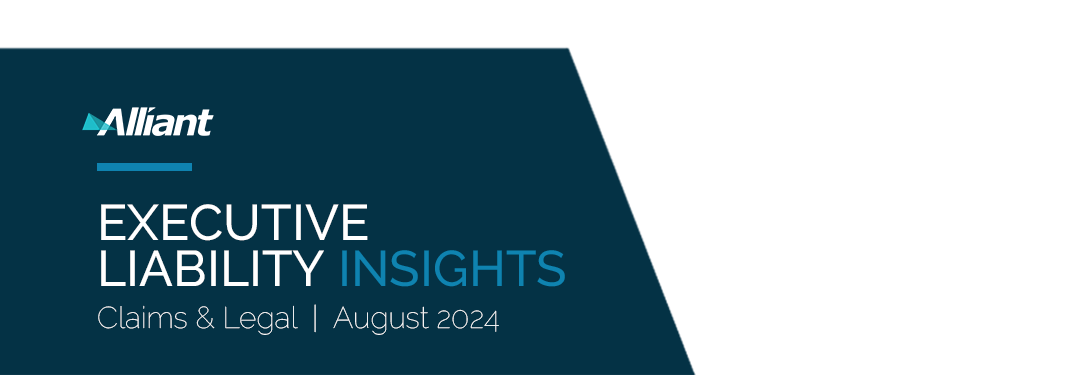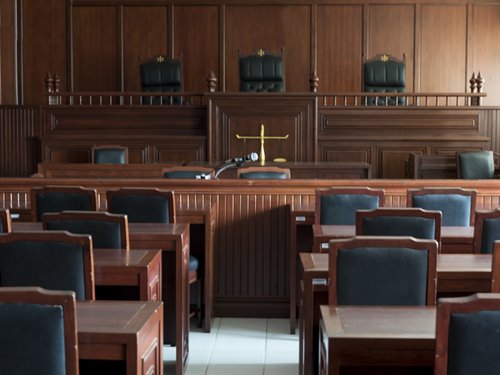
Navigating today’s complex risk environment can be a monumental task. Steve Shappell, Alliant Claims & Legal, spearheads Executive Liability Insights, a monthly review of news, legal developments and information on executive liability, cyber risk, employment practices liability, class action trends and more.


FEATURED ARTICLE
AMENDMENT TO BIPA OFFERS POTENTIAL RELIEF TO EMPLOYERS
On August 2, 2024, the Illinois legislature enacted Senate Bill 2979 (“SB2979”), providing much needed amendments to the Illinois Biometric Information Privacy Act (BIPA). Broad interpretation of the statute by the courts had previously led to massive settlements of BIPA class actions, particularly after the Illinois Supreme Court's ruling in Cothron v. White Castle Systems, 216 N.E.3d 918 (Ill. 2023).
In This Issue:
CALIFORNIA SUPREME COURT RULES IN FAVOR OF APP-BASED TRANSPORTATION COMPANIES BY UPHOLDING GIG WORKER LAW
Castellanos v. State of California, 2024 Cal. LEXIS 3981 (July 25, 2024).
The California Supreme Court upheld the constitutionality of Proposition 22 (“Prop 22”). Originally passed by voters in 2020, Prop 22 exempts certain app-based drivers from California’s independent contractor classification law. As a result, major ride-share and delivery services can continue to treat their workers as independent contractors and make them ineligible for workers’ compensation benefits and other state-mandated employment protections.
Read More >>
CROWDSTRIKE OUTAGE SHOULD PROMPT INSUREDS TO REVIEW THEIR POLICY WORDING
In what may be the most widespread cyber incident in history, a defective software update from the global cybersecurity firm, CrowdStrike, led to an abrupt outage among airlines, banks, and hospitals. While CrowdStrike took responsibility for this failure and has since addressed the software issue, many businesses are still grappling with the effects of the outage. According to a market-leading cyber risk analytic firm, insured losses are expected to reach into the hundreds of millions (and perhaps even billions) for businesses who have faced contingent business interruptions.
Read More >>
IN TEXAS, DENIAL OF COVERAGE BASED ON MATERIAL MISREPRESENTATION REQUIRES INTENT TO DECEIVE
EB Holdings II Inc. v. Nat’l Ins. Co., 2024 U.S. App. LEXIS 18627 (9th Cir.; July 29, 2024).
Under Texas law, a carrier must show an intent to deceive in order to deny coverage based on a material misrepresentation in an application. The insured was a holding company (the “Company”) that included dozens of subsidiaries, through which the Company operated battery recycling facilities and manufactured supplies for the oil exploration industry.
Read More >>
FEDERAL COURT RULES IN FAVOR OF INSURER REGARDING LATE NOTICE AND PRIOR KNOWLEDGE EXCLUSION
Meshinsky & Assocs., LLC. v. Cont'l Ins. Co., 2024 U.S. Dist. LEXIS 140969 (D.N.J.; August 8, 2024).
A federal court’s decision reiterated the importance of noticing all written demands as claims within the policy period, especially if a remote possibility that the issue could resurface in the future exists. This case involved an Insured accounting firm’s agreement to serve as an Independent Trustee for the closing and liquidation of a Charter School.
Read More >>
NEW YORK FINANCIAL REGULATORS TACKLE USE OF AI BY INSURANCE INDUSTRY
The New York State Department of Financial Services (DFS) recently issued am Insurance Circular regulating the use of artificial intelligence (AI), “external” consumer data, and information sources in the underwriting and pricing of insurance policies. The DFS seeks to ensure the responsible use of this technology, particularly around the prevention of unlawful discrimination in its deployment.
Read More >>
NO-ACTION CLAUSE IS NOT AN ESCAPE FROM THE DUTY TO DEFEND
Pangea Equity Partners, LP. v. Great American Insurance Group, Case 1:24-cv-00108-UNA (Jan. 26, 2024).
A Delaware judge refused to dismiss a claim pursuant to the “no action” clause of the Directors and Officers (“D&O”) liability policy because it was not reconcilable with the Insurer’s duty to defend. The dispute stemmed from an action brought by a real estate company’s (the “Company”) former employee (the “Employee”).
Read More >>
CYBER CORNER
Click to read the following cases:
- SOLARWINDS UPDATE: FEDERAL COURT DISMISSES SEC CYBER ENFORCEMENT ACTION
- WHAT’S $1.4 BILLION BETWEEN FRIENDS? TEXAS SETTLES BIOMETRIC DATA LAWSUIT WITH META
Read More >>
EMPLOYMENT CORNER
Click to read the following cases:
- SOCIAL MEDIA POSTS ABOUT COWORKERS ARE PART OF THE “TOTALITY OF CIRCUMSTANCES” AT A WORKPLACE
- PAGA PLAINTIFFS LACK STANDING TO INTERVENE IN OVERLAPPING ACTIONS
Read More >>
SECURITIES CORNER
Click to read the following cases:
- SEC UNVEILS NEW CYBERSECURITY REQUIREMENTS FOR REGULATION S-P
- GUIDELINES FROM THE SEC REGARDING ASSET-BACKED SECURITIES
- 2024 MID-YEAR ASSESSMENT FOR SECURITIES CLASS ACTION FILINGS
- JULY 2024 NOTEWORTHY ENFORCEMENT ACTIONS FILED
- JULY 2024 NOTEWORTHY SETTLEMENTS AND JUDGEMENTS
Read More >>
SHAREHOLDER CORNER
Click to read the following cases:
- JULY 2024 SECURITIES CLASS ACTION FILINGS
Read More >>
AMENDMENT TO BIPA OFFERS POTENTIAL RELIEF TO EMPLOYERS


On August 2, 2024, the Illinois legislature enacted Senate Bill 2979 (“SB2979”), providing much needed amendments to the Illinois Biometric Information Privacy Act (BIPA). Broad interpretation of the statute by the courts had previously led to massive settlements of BIPA class actions, particularly after the Illinois Supreme Court's ruling in Cothron v. White Castle Systems, 216 N.E.3d 918 (Ill. 2023). In Cothron, the court held that each instance of unauthorized collection, storage, and/or use of biometric information without proper consent results in separate “per scan” damages. That ruling suggested potential annihilative damages against employers that violated BIPA, as multiple “per scan” violations could result in billions of dollars of damages.
SB2979 clarifies that multiple alleged collections or disseminations of an individual’s biometrics constitute only a single violation of the Privacy Act and the individual is limited to only one recovery of statutory damages. With the amended statute, employers that require their employees to sign in using fingerprint scans or other biometric information each time they clock in or out (and without having the proper consent and disclosures in place) would now only be subject to “at most, one recovery” of $1,000 or $5,000. This answers the open question that the court in Cothron left to the lawmakers. SB 2979 also clarified that electronic signatures on BIPA consent forms are valid and compliant with BIPA’s requirements.
While the amendments do not address retroactivity, the amendments should apply to pending BIPA claims based on legislative intent.
CALIFORNIA SUPREME COURT RULES IN FAVOR OF APP-BASED TRANSPORTATION COMPANIES BY UPHOLDING GIG WORKER LAW
Castellanos v. State of California, 2024 Cal. LEXIS 3981 (July 25, 2024).


The California Supreme Court upheld the constitutionality of Proposition 22 (“Prop 22”). Originally passed by voters in 2020, Prop 22 exempts certain app-based drivers from California’s independent contractor classification law. As a result, major ride-share and delivery services can continue to treat their workers as independent contractors and make them ineligible for workers’ compensation benefits and other state-mandated employment protections.
This decision stemmed from a complaint filed by app-based service workers and their union against various companies. The app-based workers argued that Prop 22 was unconstitutional because it limits the legislature’s power to change or pass laws regarding workers’ compensation programs and conflicts with Article XIV Section 4 of the California Constitution. The court rejected the workers’ argument and held that Prop 22 did not impede on the legislature’s power over workers’ compensation programs because California voters also possess the power to pass initiatives to impact the state’s workers’ compensation systems.
While this decision is a big win for app-based companies in California, the fight over Prop 22 is long from being over. In its decision, the court left the door open for potential arguments regarding the legislature’s ability to enact laws that can extend workers’ compensation benefits to these app-based workers. Employers are encouraged to monitor the court’s rulings on this issue closely and ensure that their current policies afford coverage for any potential employment and labor violations.
CROWDSTRIKE OUTAGE SHOULD PROMPT INSUREDS TO REVIEW THEIR POLICY WORDING


In what may be the most widespread cyber incident in history, a defective software update from the global cybersecurity firm, CrowdStrike, led to an abrupt outage among airlines, banks, and hospitals. While CrowdStrike took responsibility for this failure and has since addressed the software issue, many businesses are still grappling with the effects of the outage. According to a market-leading cyber risk analytic firm, insured losses are expected to reach into the hundreds of millions (and perhaps even billions) for businesses who have faced contingent business interruptions.
CrowdStrike’s outage has the potential to be a major event for cyber insurance carriers and their insureds. Airlines, healthcare facilities, and banking institutions will be looking to their cyber policies to recoup their losses. Specifically, impacted businesses should focus on whether their policies cover “dependent” or “contingent” system failures. Unfortunately, merely having coverage for attacks on a shared computer system is not sufficient; insureds must determine whether their policy also has coverage for an inadvertent outage on the network of a company that the insured depends upon to conduct business. Ideally, the full policy limits should be offered but this coverage is sometimes sub-limited. Lastly, insureds must determine whether the time during which they incurred lost income and extra expenses because of the outage exceeds the policy waiting period, which is typically in the range of eight to twelve hours.
One of the many lessons to learn from CrowdStrike’s debacle is that policy wording matters. Now more than ever, impacted businesses should dive into their current policy and see how policy provisions are phrased, and whether their broker has negotiated the best available coverage. If not yet in the policy, insureds are encouraged to explore coverage for contingent system failure. With losses mounting due to the CrowdStrike outage, businesses should also work on business continuity planning should another major IT meltdown take place again.
IN TEXAS, DENIAL OF COVERAGE BASED ON MATERIAL MISREPRESENTATION REQUIRES INTENT TO DECEIVE
EB Holdings II Inc. v. Nat’l Ins. Co., 2024 U.S. App. LEXIS 18627 (9th Cir.; July 29, 2024).


Under Texas law, a carrier must show an intent to deceive in order to deny coverage based on a material misrepresentation in an application. The insured was a holding company (the “Company”) that included dozens of subsidiaries, through which the Company operated battery recycling facilities and manufactured supplies for the oil exploration industry. The Company renewed its D&O coverage for itself as well as its subsidiary companies. During the renewal process, underwriters were provided with a consolidated balance sheet that represented some of Company’s long-term debt. Prior applications with the same carrier had disclosed the full extent of the debt.
Following renewal, the Company was sued for allegedly fraudulently inducing the purchase of notes by failing to disclose that a subsidiary had engaged in market manipulation and price fixing in Europe. The Company noticed the suit, which was denied by the carrier. The denial letter referenced the Company’s long-term debt, but it relied on an exclusion for claims brought against security holders of the Company’s subsidiary as the basis for the denial. The lawsuit later settled, and the Company filed suit against the carrier alleging, among other things, breach of the insurance policy and bad faith. During litigation, the carrier argued that coverage under the policy was barred by the Company’s material misrepresentations of the full extent of its long-term debt in its insurance application. The lower court, applying Nevada law, agreed, finding there was no coverage because of the material misrepresentation. The decision was appealed.
Ultimately, the Ninth Circuit determined Texas law applied to the carrier’s affirmative defense of material misrepresentation. Under Texas law, the carrier was required to show, in addition to a material misrepresentation, “1) that there was intent to deceive on the part of the [Company]; and (2) that [the carrier] gave notice to the [Company] of its refusal to be bound by the policy, within 90 days of discovering the falsity of the application.” Therefore, the lower court’s decision was reversed and remanded.
FEDERAL COURT RULES IN FAVOR OF INSURER REGARDING LATE NOTICE AND PRIOR KNOWLEDGE EXCLUSION
Meshinsky & Assocs., LLC. v. Cont'l Ins. Co., 2024 U.S. Dist. LEXIS 140969 (D.N.J.; August 8, 2024).


A federal court’s decision reiterated the importance of noticing all written demands as claims within the policy period, especially if a remote possibility that the issue could resurface in the future exists.
This case involved an Insured accounting firm’s agreement to serve as an Independent Trustee for the closing and liquidation of a Charter School. While serving in this capacity, the Insured received letters from a judgment creditor of the Charter School requesting public records pursuant to the New Jersey Open Public Records Act. Subsequently, the judgment creditor filed a complaint with the New Jersey Government Records Counsel (the “GRC”), who filed interim orders on the matter. Most notably, the GRC distributed a Second Interim Order in which the GRC found in favor of the judgment creditor and awarded attorney’s fees. Later, the Insured filed a Request for Reconsideration in which the Insured, among other things, referenced “potential disputes” with the judgment creditor that may result in further disputes.
Eventually, the Insured was served with a Complaint filed by the judgment creditor seeking the books and records previously requested, dissolution of the Charter School, and bank records. The Insured reported the Complaint to its insurer under the professional liability insurance policy. The date of the Complaint’s filing fell within the policy period; however, the date when GRC issued a Second Interim Order fell before the inception of the policy at issue. Subsequently, the insurer issued a denial letter citing a late notice issue, the Prior Notice Exclusion, and a warranty statement provided by the Insured, all relating to the complaint, letters, and orders issued prior to the inception of the policy.
The policy defined Claim as a "demand received by you for money or services naming you and alleging an act or omission, including personal injury or advertising injury, in the rendering of professional services.” According to the court, the Second Interim Order “clearly found the Insured liable for damages in the form of attorney's fees,” which met the definition of Claim. Therefore, the GRC Second Interim Order was a Claim that was first made before the noticed policy’s inception. Because the Second Interim Order and the Complaint were “interrelated claims,” there was no coverage for the Complaint, too.
The court also ruled that the Prior Knowledge Exclusion applied to bar coverage for the matter. The Prior Knowledge Exclusion provided coverage would only be available for a Claim if “prior to the effective date of this Policy, none of you had a basis to believe that any such act or omission, or interrelated act or omission, might reasonably be expected to be the basis of a claim.” In deciding this question, the court utilized the subjective-objective test. Under this analysis, the exclusion was satisfied "if the insured had knowledge of the relevant suit, act, error, or omission”—subjective awareness. And “whether a reasonable professional in the insured's position [would have expected] a claim or suit to result”—objective awareness. The court ruled that the Request for Reconsideration filed by the Insured satisfied both, subjective and objective, prongs of the test. Thus, Prior Knowledge Exclusion was triggered as a bar to coverage.
NEW YORK FINANCIAL REGULATORS TACKLE USE OF AI BY INSURANCE INDUSTRY


The New York State Department of Financial Services (DFS) recently issued an Insurance Circular regulating the use of artificial intelligence (AI), “external” consumer data, and information sources in the underwriting and pricing of insurance policies. The DFS seeks to ensure the responsible use of this technology, particularly around the prevention of unlawful discrimination in its deployment.
Insurers will be required to produce “proxy assessments” to demonstrate that the use of data derived from this technology does not have a discriminatory impact upon protected classes. The DFS also mandated oversight of the use of AI and external data sources by the insurer’s Board of Directors and senior executives. Insurers are expected to be transparent about their use of AI and to disclose how this technology influences underwriting and pricing decisions. Insurers must also provide consumers with a basis for any adverse decisions resulting from reliance upon such data sources. Recognizing the role of third-party service providers in the field of AI, the DFS clarified that insurers will be responsible for selecting vendors who comply with applicable laws and regulations governing the use of AI.
While AI promises to bring efficiency to the insurance industry by aggregating data and streamlining business processes, regulators are keen to ensure consumers’ rights are not sacrificed in the process. Apart from the obvious need to protect confidential data (the breach of which could trigger coverage under a Cyber insurance policy), the focus on non-discrimination suggests that third-party civil rights claims could result from the misuse of AI, which have the potential to trigger Employment Practices Liability coverage.
NO-ACTION CLAUSE IS NOT AN ESCAPE FROM THE DUTY TO DEFEND
Pangea Equity Partners, LP. v. Great American Insurance Group, Case 1:24-cv-00108-UNA (Jan. 26, 2024).


A Delaware judge refused to dismiss a claim pursuant to the “no action” clause of the Directors and Officers (“D&O”) liability policy because it was not reconcilable with the Insurer’s duty to defend.
The dispute stemmed from an action brought by a real estate company’s (the “Company”) former employee (the “Employee”). The Employee alleged that the Company violated the False Claims Act when it participated as a landlord in the U.S. Department of Housing and Urban Development’s Section 8 (the “Section 8 Program”). According to the Employee, the Company violated the Section 8 Program by falsely certifying that they were not charging more rent for assisted units than for unassisted comparable units.
In liability policies, no action clauses are common and generally prohibit an action to be taken against an Insurer until a determination about Insurer’s liability and compliance with the policy is reached. However, on a bench ruling, the judge held that they struggled to reconcile the no-action clause with the broad concept of Insurer’s duty to defend and refused to dismiss the action, siding with the Company.
Cyber Corner
SOLARWINDS UPDATE: FEDERAL COURT DISMISSES SEC CYBER ENFORCEMENT ACTION
Securities and Exchange Commission v. SolarWinds Corp et al., 1:23-cv-09518 (S.D.N.Y.; July 18, 2024).
In a highly publicized decision, a federal district court dismissed, in large part, an aggressive enforcement action filed by the SEC against a leading software technology company (the “Company”) and its Chief Information Security Officer (CISO). The Company was the victim of a Russian-backed cyberattack. The impact of the cyberattack was widespread amongst the IT departments of the Company’s vast customer base and allowed the bad actors to infiltrate at least nine federal agencies.
WHAT’S $1.4 BILLION BETWEEN FRIENDS? TEXAS SETTLES BIOMETRIC DATA LAWSUIT WITH META
Social media behemoth Meta Platforms has settled a lawsuit with the state of Texas arising out of the company’s use of facial recognition to collect biometric data on Facebook users. The Texas Attorney General has called it, “the largest settlement ever obtained from an action brought by a single state,” and said the settlement demonstrated the state’s commitment to holding technology companies accountable. The settlement is the first ever obtained by the state under the Texas Capture or Use of Biometric Identifier (CUBI) Act.
Employment Corner
SOCIAL MEDIA POSTS ABOUT COWORKERS ARE PART OF THE “TOTALITY OF CIRCUMSTANCES” AT A WORKPLACE
Okonowsky v. Garland, 2024 U.S. App. LEXIS 18357, (9th Cir.; July 25, 2024).
Social media posts that include revealing photographs of colleagues or indirectly target employees of a given workplace, even when posted anonymously and without naming anyone specifically, could create a hostile work environment and lead to Title VII violations. The staff psychologist of a federal prison alleged that she was subjected to sexual harassment which created a hostile work environment.
PAGA PLAINTIFFS LACK STANDING TO INTERVENE IN OVERLAPPING ACTIONS
Turrieta v. Lyft, Inc., No. S271721, 2024 Cal. LEXIS 4156 (Aug. 1, 2024).
In its recent ruling, the California Supreme Court held that an aggrieved employee bringing an action under California Labor Code Private Attorneys General Act (“PAGA”) does not have the right to intervene in or object to potential settlements in overlapping PAGA actions. Under PAGA, employees asserting labor code violations against an employer may do so on behalf of themselves or other current or former employees.
Securities Corner
SEC UNVEILS NEW CYBERSECURITY REQUIREMENTS FOR REGULATION S-P
The SEC recently adopted amendments to Regulation S-P that will expand the scope of requirements applicable to domestic and foreign brokers, dealers, investment companies, and SEC-registered investment advisers. The purpose of the amendments is to increase the protection of nonpublic personal information and to ensure that customers are notified timely in the event of a security incident.
GUIDELINES FROM THE SEC REGARDING ASSET-BACKED SECURITIES
Recently, the Division of Corporation Finance within the SEC issued three new Compliance and Disclosure Interpretations (C&DIs) related to the rules and forms adopted under Regulation AB, the Securities Act, and the Exchange Act with respect to asset-backed securities. While C&DIs would not be legally binding, they were issued to provide guidance to those responsible for compliance with federal securities laws.
2024 MID-YEAR ASSESTMENT FOR SECURITIES CLASS ACTION FILINGS
With the first half of 2024 ending, Cornerstone released its mid-year assessment. The mid-year assessment shows that there was a slight increase in securities class actions in federal and state courts in comparison to the second half of 2023. Additionally, while artificial intelligence (“AI”) filings were not new, the first half of 2024 marks the beginning of tracking filings with allegations related to AI.
|
Director/Officer |
Role |
Company |
|
Alan Lane & Kathleen Fraher |
CEO & CRO |
Silvergate Capital Corporation |
|
Patrick Orlando |
Former CEO & Chairman |
Digital World Acquisition Corporation |
|
Robert Newell |
Founder & CEO |
Black Hawk Funding, Inc. |
|
Thomas San Miguel |
Former CEO |
SGR Energy, Inc. |
Director/Officer | Role | Company |
Alan Lane & Kathleen Fraher | CEO & CRO | Silvergate Capital Corporation |
Patrick Orlando | Former CEO & Chairman | Digital World Acquisition Corporation |
Robert Newell | Founder & CEO | Black Hawk Funding, Inc. |
Thomas San Miguel | Former CEO | SGR Energy, Inc. |
JULY 2024 NOTEWORTHY SETTLEMENTS AND JUDGMENTS
|
Amount |
Director/Officer |
Role |
Company |
|
$1,147,440 |
Gene Daniel Levoff |
Officer |
Apple Inc. |
|
$7,801,977.09 |
George Iakovou |
CEO |
Vika Ventures LLC |
Amount | Director/Officer | Role | Company |
$1,147,440 | Gene Daniel Levoff | Officer | Apple Inc. |
$7,801,977.09 | George Iakovou | CEO | Vika Ventures LLC |
Source: U.S. Securities and Exchange Commission
https://www.sec.gov/litigation/admin.htm
Source: Stanford Law School Securities Class Action Clearinghouse
ABOUT ALLIANT INSURANCE SERVICES
Alliant Insurance Services is the nation’s leading specialty broker. In the face of increasing complexity, our approach is simple: hire the best people and invest extensively in the industries and clients we serve. We operate through national platforms to all specialties. We draw upon our resources from across the country, regardless of where the resource is located.
Contributors


Abbe Darr, Esq.
Claims Attorney
abbe.darr@alliant.com
David Finz, Esq.
Claims Attorney
david.finz@alliant.com
Isabel Arustamyan, Esq.
Claims Attorney
isabel.arustamyan@alliant.com
Jacqueline Vinar, Esq.
Claims Attorney
jacqueline.vinar@alliant.com
Jaimi Berliner, Esq.
Claims Attorney
jaimi.berliner@alliant.com
Karina Montoya, J.D.
Claims Advocate
karina.montoya@alliant.com
Malia Shappell, Esq.
Claims Attorney
malia.shappell@alliant.com
Michael Radak, Esq.
Claims Attorney
michael.radak@alliant.com
Peter Kelly, Esq.
Claims Attorney
peter.kelly@alliant.com
Robert Aratingi
Senior Claims Advocate
robert.aratingi@alliant.com
Steve Levine, Esq.
Claims Attorney
slevine@alliant.com